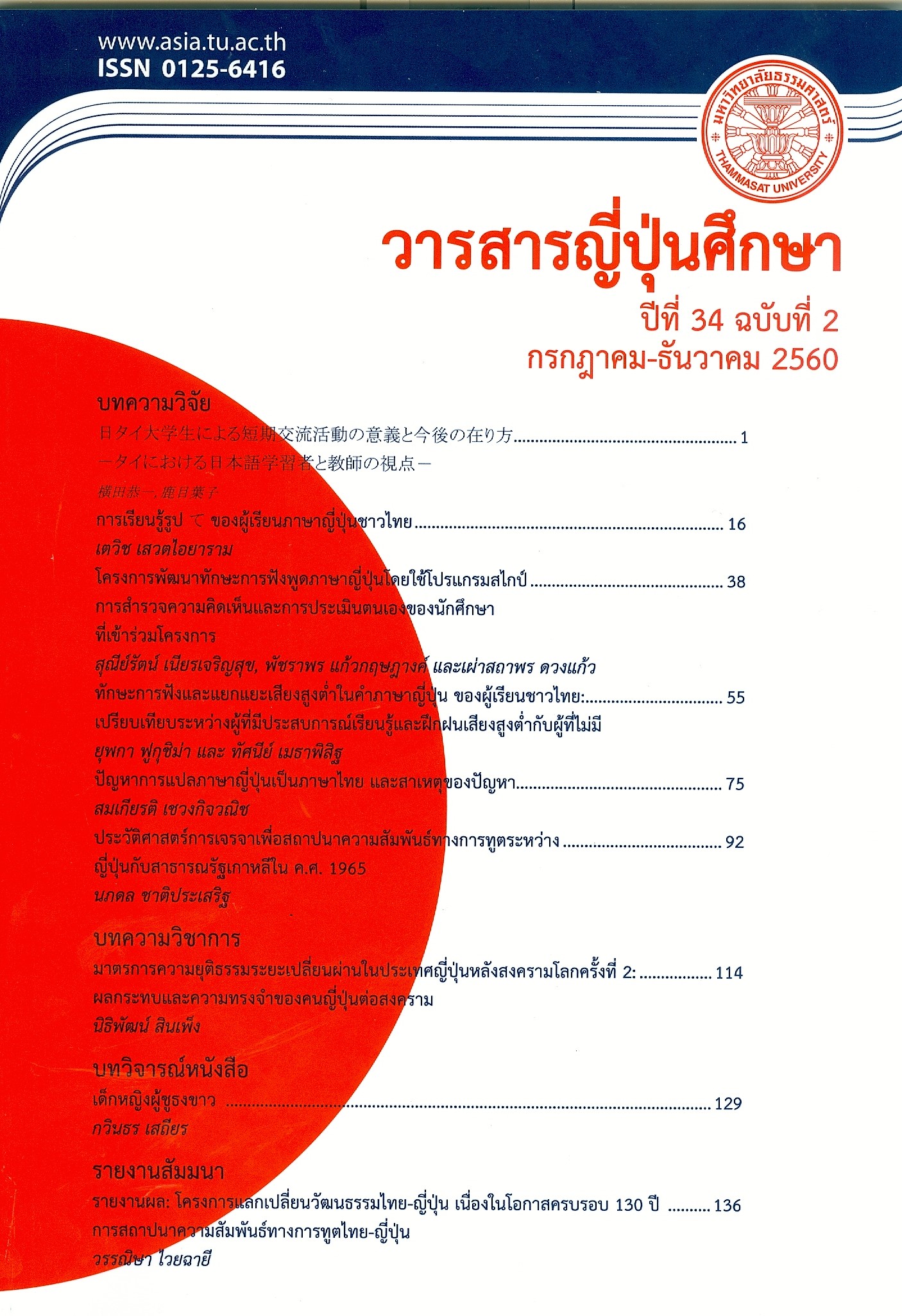มาตรการความยุติธรรมระยะเปลี่ยนผ่านในประเทศญี่ปุ่นหลังสงครามโลกครั้งที่ 2: ผลกระทบและความทรงจำของคนญี่ปุ่นต่อสงคราม
คำสำคัญ:
ความยุติธรรมระยะเปลี่ยนผ่าน, ความรู้สึกว่าตนตกเป็นเหยื่อ, สงครามโลกครั้งที่ 2, นโยบายการต่างประเทศของญี่ปุ่น, อาชญากรสงครามบทคัดย่อ
หากกล่าวถึงญี่ปุ่นและสงครามโลกครั้งที่ 2 หลายคนมักจะเปรียบเทียบญี่ปุ่นกับเยอรมนีเนื่องจากความคล้ายคลึงทางประวัติศาสตร์บางประการของทั้งสองประเทศ เป็นต้นว่า ได้ร่วมทำสงครามโลกครั้งที่ 2 ในฝ่ายเดียวกันและต่างก็เป็นฝ่ายพ่ายแพ้ในสงครามเช่นกัน แต่ทว่า วิธีการที่ทั้งสองประเทศกลับมาสร้างความสัมพันธ์กับประเทศเพื่อนบ้านหลังสิ้นสุดสงครามกลับต่างกันโดยสิ้นเชิง กล่าวคือ ในขณะที่เยอรมนีประสบความสำเร็จในการสร้างความเชื่อมั่นกับเหล่าชาติตะวันตก ญี่ปุ่นกลับประสบปัญหากับบรรดาประเทศผู้เสียหายจากการแสดงท่าทีไม่ยอมรับและปฏิเสธความรับผิดชอบต่อการกระทำอันโหดร้ายทารุณระหว่างสงคราม ความแตกต่างนี้เองที่นำไปสู่คำถามว่าอะไรทำให้ญี่ปุ่นแสดงท่าทีในลักษณะเช่นนี้ ซึ่งคำถามนี้ยังช่วยให้เข้าใจวิธีการประนีประนอมของญี่ปุ่นและเข้าใจว่าทำไมความพยายามในการสมานรอยร้าวในประวัติศาสตร์ของญี่ปุ่นบางครั้งจึงไม่ประสบความสำเร็จ
บทความนี้เสนอว่า ความไม่สมบูรณ์และความไม่ต่อเนื่องของมาตรการความยุติธรรมระยะเปลี่ยนผ่านที่ฝ่ายประเทศผู้ชนะสงครามได้ดำเนินการต่อญี่ปุ่นหลังสงครามนั้น มีผลเป็นการสร้างความรู้สึกว่าชาวญี่ปุ่นตก เป็นเหยื่อมากกว่าเป็นผู้กระทำผิด ประกอบกับความเสียหายที่เกิดจากทั้งฝ่ายศัตรูในสงครามและฝ่ายตนเองยิ่งทำให้ความรู้สึกนี้ประจักษ์ชัดขึ้นและทำให้ความรู้สึกว่าตนเป็นผู้กระทำความผิดได้เลือนรางลง ความรู้สึกว่าตนเป็นเหยื่อเสียมากกว่าผู้กระทำผิดนี้เองคือปัจจัยหลักในการทำให้ญี่ปุ่นไม่ยอมรับและปฏิเสธความรับผิดชอบต่อการกระทำอันโหดร้ายทารุณระหว่างสงคราม โดยสะท้อนให้เห็นเสมอมาในการแสดงคำขอโทษและนโยบายการต่างประเทศของญี่ปุ่น




